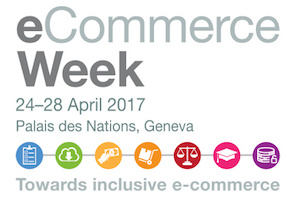Supporting the involvement of small and medium-sized enterprises in e-commerce
28 Apr 2017 02:00h
Event report
In this session, the experiences of Small and Medium-Sized Enterprises (SMEs) in developed countries in adopting e-commerce technology was compared to those in developing countries. The panel addressed how e-commerce has changed trade for small firms, the difficulties these firms have faced, and ways in which stakeholders can co-operate to promote further e-commerce adoption in developing countries.
H.E. Mr Julian Braithwaite, Ambassador and Permanent Representative of the UK Mission to the UN and Other International Organisations in Geneva, began the discussion by reaffirming the UK’s interest in e-commerce as a driver of growth in its own economy, and emphasised the need for inclusiveness to close the digital divide between developing and developed countries. He then addressed the fact that the digital agenda is fragmented between many international organisations, and argued that intelligent future regulation must break down these silos.
Ms Angela Steen, from the peer-to-peer e-commerce company Etsy, gave the perspective of micro-enterprises using e-commerce platforms. She outlined four main challenges faced by Etsy’s sellers, most of whom are young women selling their products globally: trade laws have not kept up with the growth of e-commerce and have put unnecessary burdens on micro-companies, sellers face short-term income volatility and struggle to find ways to educate themselves about upscaling their businesses, and governments tend to ignore the needs of these businesses in their policies.
Ms Berna Ozsar, Secretary General of the World SME Forum, highlighted the fact that e-commerce has been both a blessing and a curse for developing countries. While e-commerce has allowed SMES in developed countries to access sources of finance and previously untapped markets, SMEs in developing countries have fallen behind. These developing country SMEs face three main issues: lack of awareness about e-commerce, lack of access, and lack of knowledge (regarding language barriers and confusing custom laws).
Ms Hannie Melin Olbe, Director of Global Public Policy at eBay, added to the topic of ‘lack of access’ by addressing the massive amounts of micro-enterprises unconnected to the global markets. She discussed the tremendous role of online commerce in lowering costs of distance to create a ‘global empowerment network’ that provides opportunities for these previously unconnected enterprises to reach new markets.
Ms Colette van der Ven, Associate of Sidley-Austin LLP, discussed the legal hurtles that her clients must face to conduct e-commerce. SMEs must overcome both traditional and new legal obstacles, thereby increasing costs and hurting innovation. One solution to this problem is an ‘E-comm Co-op’, which aggregates hundreds of merchants and provides benefits and resources that they would not otherwise receive.
Ms Victoria Saue, Head of Legal and Compliance of Estonia’s e-Residency, discussed her country’s innovative approach to help SMEs by allowing anyone around the world to apply for e-residency in Estonia. This gives SMEs three main benefits: providing access to economic opportunities in the EU, increasing financial inclusion – such as the ability to receive loans, and creating trust in these SMEs through a valid Estonian ID.
Ms Famke Schapp, Director of Customs and Global Trade at Deloitte, discussed the major compliance challenges that Deloitte’s clients must face when conducting e-commerce. These challenges included the confusion behind deciding whether they provide goods or services, lack of clarity and harmony in taxes and standards, and burdensome regulatory costs that vary by country.
Ms Susan F Stone, Director of the Trade, Investment and Innovation Division of UN Economic and Social Commission or Asia and the Pacific (ESCAP), finished the panel discussion by advocating for UNCTAD’s eTrade for All Platform to prevent fragmentation, duplication, and redundancy of trade standards for e-commerce. Stone also discussed successful examples of knowledge sharing agreements that provide frameworks for governments to agree to common standards and vocabulary involving digital issues.
The discussion then moved towards input from the audience. Emphasis was placed on the experiences and challenges of an entrepreneur from Syria who aggregates and sells online the arts and crafts of women displaced by the Syrian Civil War. Her main challenge was the difficulty of receiving payments due to sanctions on Syria and her government’s policies, which greatly limits her e-commerce potential. Further questions and answers from the audience re-emphasised the need to limit the regulatory and tax burden of SMEs, create standardised trade agreements, and encourage SMEs to adopt e-commerce measures through success stories and relevant data.
Related topics
Related event

